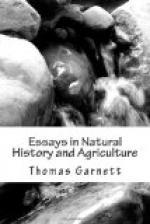Let us take the second supposition, that there is no good in artificial propagation when the fish which are sent to the sea can never come back again by reason of insurmountable obstacles. If Mr. Horsfall means this he is quite right; there is no good in the upper proprietors of Salmon rivers becoming brood hens for the owners of fisheries at the mouths of rivers or the proprietors of impassable weirs, who take all the fish which get to the foot of these weirs. I quite agree with Mr. Horsfall that it is in most cases easy to build practicable fish passes, and at a slight expense, if people were willing to do so; but I wish to show that notwithstanding the boasted effects of the Act of 1861, the upper riparian proprietors have not a sufficient inducement to build fish passes, and will not do so unless the expense can be made very moderate indeed.
I will take the river Ribble to illustrate my meaning. As a general rule we have no fresh run Salmon until May, and the upper proprietors are supposed to have a sufficient share of the fish that ascend the stream if the owners of the fisheries in the estuary and the tidal part of the river cease to net from six o’clock on the Saturday night to six o’clock on the Monday morning. That is a day and a half per week. The fishing for Salmon (except angling) ceases on the 31st of August, and from the 1st of May to the 31st of August there are 123 days. Call the period eighteen weeks, which gives us twenty-seven days during which time the Salmon have liberty to pass to the upper parts of the river. But on the average of seasons, owing to droughts, the rapid absorption of moisture by vegetation, and the great evaporation, there is no fresh water to enable the fish to ascend during two-thirds of that time. Every one who knows anything of the habits of Salmon is aware that they never ascend the rivers from the estuary unless there is a fresh in the river; and, as I said before, on the average of seasons there is no fresh for two-thirds of the time from May to August. This reduces the twenty-seven days (which are supposed to feed the upper proprietors with Salmon to repletion) to nine days, and these nine days are expected to stock the river and its tributaries for one hundred miles. It is true I have not taken into consideration the privileges which the upper proprietors have of angling to the 1st of November; but besides the fact that the fish are then full of spawn, and ought not to be killed at all, very few rise at the fly, and when they are taken they can neither be sold nor used by any one who knows what a fresh Salmon is. It is a greater crime against public polity to kill a spawning Salmon than it is to steal a sheep; for, supposing it produces 10,000 ova, and one in a hundred returns as a Salmon, it returns from a place (the sea) where it has cost nothing in rent, taxes, or superintendence, and, in the finest condition imaginable, it invites us to take it.
Mr. Horsfall and I both wish for the same results (rivers swarming with fish), and although we may somewhat differ as to details, I have no doubt both would be glad to see public attention directed to these matters rather more than it is at present.




